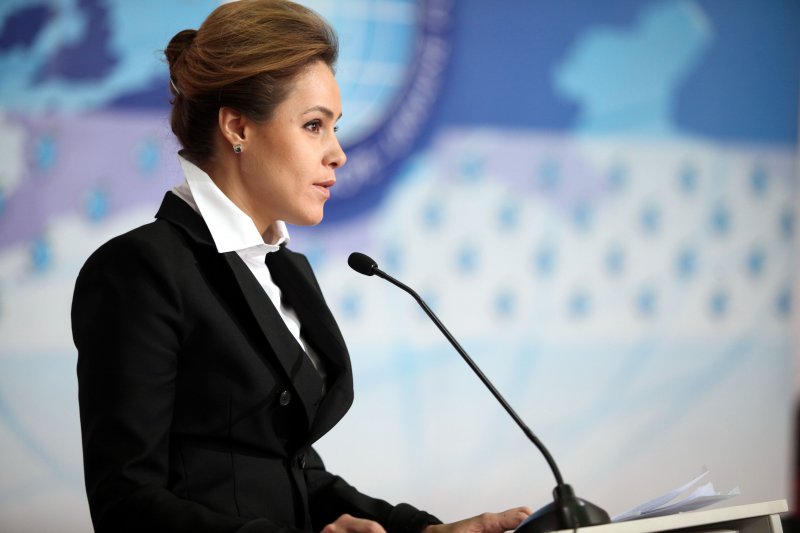
The “Blackmail State” Re-Emerges in Ukraine
Publication: Eurasia Daily Monitor Volume: 9 Issue: 14
By:

Since Viktor Yanukovych’s election victory, four strategies have been adopted against the opposition that in particular targets Yulia Tymoshenko and her eponymous bloc (BYuT). BYuT became the dominant national democratic party in the last decade increasing its share of the vote from 7 percent (2002), 24 percent (2006) to 31 percent (2007). In the 2007 parliamentary and 2010 presidential elections BYuT and Tymoshenko received 3 percent less on both occasions than the Party of Regions and Yanukovych respectfully.
As opposition leader Yanukovych expected to win by over 10 percent in the 2010 elections, but only scraped through with a 3 percent victory over Prime Minister Tymoshenko – and he won fewer votes than in 2004. In 2015, with their positions of incumbent and opposition leader reversed, Tymoshenko would be likely to win the elections.
BYuT and Tymoshenko’s ability to challenge the Party of Regions’ political machine ensured that “Orange” coalitions be formed after elections (whether they could work together is a separate but important question). The Party of Regions’ only ally is the Communist Party of Ukraine (KPU), but its additional 5 percent to the Party of Regions vote (31 percent, 2006 and 34 percent in 2007) is insufficient to establish a coalition, as seen in 2007. A Party of Regions-led coalition required a third party that in 2006 was provided by the defection of the Socialist Party of Ukraine (SPU).
Four strategies have been directed against Tymoshenko and BYuT:
1. Preventing the registration of candidates from Batkivshchina (Fatherland), the party Tymoshenko leads in popular bases of support such as Kyiv and Lviv. This strategy was used in the October 2010 local elections and could be used again in this year’s October parliamentary elections.
2. Imprisoning Tymoshenko and other popular leaders such as the former Interior Minister Yuriy Lutsenko on trumped up charges and through selective use of the judiciary. Former President Viktor Yushchenko, former Prime Minister Yuriy Yekhanurov and other Our Ukraine leaders have not been targeted, nor has Front for Change party leader Arseniy Yatseniuk. Yet, all were members of the 2005-2010 “Orange” administration.
The need to remove the Tymoshenko threat from Ukrainian politics brought about the 7+3 sentence (imprisonment and ban from public office) that removes her from the next two presidential and three parliamentary elections. The sentence gives Yanukovych and the Party of Regions a competition-free political field over the next decade.
3. Pressure on big business and oligarchs not to provide financial and other resources for the opposition parties and leaders. Television news lambasts opposition parties, and opposition leaders are given little television air time. Toleration of political and business pluralism that existed under Kuchma, when elites and oligarchs provided financial resources for the opposition and pro-presidential parties, is no longer available. Under Kuchma, Our Ukraine big businessman Petro Poroshenko launched the Channel 5 television channel that gave the opposition air time.
4. Engineering divisions within BYuT. The election of Natalya Korolevska, a BYuT parliamentary deputy from Luhansk (Donbas), as new leader for the Social Democratic Party of Ukraine (SDPU) is an example of sowing dissension within the BYuT faction. The Social Democratic PSDPU had already included candidates from the Party of Regions in the 2010 local elections. Financing of the SDPU by the Party of Regions and authorities is now likely to take place under Korolevska (https://www.pravda.com.ua/articles/2011/12/27/6870903/).
Korolevska was elected party leader at an SDPU congress held not coincidentally on the day of Tymoshenko’s December 2011 court appeal. Korolevska’s new position is “a project by Serhiy Levochkin,” the head of the presidential administration (https://www.pravda.com.ua/articles/2011/12/27/6870903/).
Levochkin is a former senior adviser to President Leonid Kuchma and member of the anti-Tymoshenko “gas lobby.” He has lots of experience in Byzantine behind-the-scenes Ukrainian politics (see EDM, March 18, 2010 and December 4, 2011).
Oleksandra Kuzhel resigned in protest of Deputy Prime Minister Sergei Tigipko’s plans to merge the Silna Ukraina (Strong Ukraine) party with the Party of Regions. On this question she wrote, “when according to Bankova’s scenario (name of street where the presidential administration is located) to change leaders began, it represented the next stage in the authorities’ plans for a managed democracy in Ukraine” (https://www.pravda.com.ua/columns/2012/01/11/6903056/).
In 1994, the Minister of Justice Vasyl Onopenko established the Party of Human Rights that merged a year later with the Ukrainian Party of Justice and the SDPU that became the SDPUo (Social Democratic United Party of Ukraine). The right wing of Ukrainian social democracy was led by the SDPU in contrast to the more leftist SPU established in fall 1991.
In 1997-1998, an anti-oligarch wing split away from the SDPUo and reformed itself as the SDPU. The SDPUo became the pro-Kuchma centrist political representation of the Kyiv clan. The SDPU aligned with opposition party’s such as Batkivshchina in the Forum for National Salvation in 2001 and was a member of BYuT in the 2002, 2006 and 2007 elections. Onopenko was the leader of the SDPU until 2006, when his son-in-law Yevhen Kornichuk became its leader. In 2010-2011, Kornichuk spent three months in prison related to when he was Deputy Justice Minister in the 2007-2010 Tymoshenko government.
This was when the “Levochkin project” took place.
The leadership of the SDPU passed to Korolevska. Levochkin foresees the SDPU playing a similar loyalist role in Ukrainian politics as A Just Russia party, which is loyal to the Vladimir Putin regime (www.spravedlivo.ru, www.usdp.kiev.ua). The SDPU and A Just Russia would take votes from bona fide opposition parties, such as Batkivshchina in Ukraine, in parliamentary elections. Korolevska, who is photogenic like Tymoshenko, would compete with Tymoshenko in presidential elections.
Judicial reform adopted in July 2010 is a deliberate destruction of the power of the Supreme Court that conflicts with the 1996 constitution that designates this institution as the highest judicial body for courts of general jurisdiction (see US Judge Bohdan Futey, “The suppression of an independent judiciary in Ukraine” at https://www.kyivpost.com/news/opinion/op_ed/detail/119708/).
This step has been taken to end the independence of the judiciary by absorbing it within the executive through the newly established High Council of Justice and also as banal revenge for the Supreme Court’s December 2004 annulment of Yanukovych’s second round election. The reforms and replacement of Onopenko by a Yanukovych loyalist means that “those in power have removed all barriers from the path to a loyal Supreme Court” (https://ukrainianweek.com/Politics/38362). This was a good example of what Yale University Professor Keith Darden calls the “Blackmail State,” where officially sanctioned corruption is used as an instrument of state control.
Petro Pylypchuk became Chairman of the Supreme Court in December 2011, after Onopenko decided not to stand for re-election when his term expired. Ukrainian experts claimed Onopenko’s decision not to stand was part of a “Blackmail State” deal with Yanukovych under which criminal charges were dropped against his daughter Iryna Onopenko, her ex-husband Volodymyr Kotliarov and Onopenko’s son-in-law Korniychuk.
As part of the deal, Korniychuk passed the SDPU to the authorities who installed Korlevska as its new leader. In the 1990s the SDPU and SPU were invited to join the Socialist International (SI), which turned down the oligarch-dominated SDPUo’s request. The SI would do well to now take another look at the SDPU, which is a Party of Regions virtual satellite party.




